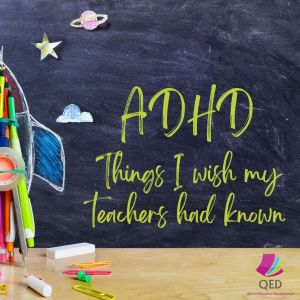The last year has been interesting. The Department for Education has developed the early years foundation stage even further to include a goal around self-regulation. This caused me to pull out lots of saved research from a while back looking at executive function in primary education and in particular, early years education.
Children’s heads tend to be full of information and as teachers we spend a lot of time filling them with more. However, we tend to spend little time developing the part of the brain – the prefrontal cortex – where executive function lives. Now, it appears, we have permission to build this into our curricular approach. This is particularly exciting for me as an adult with ADHD.
What is ADHD and how does this link to executive function and self regulation?
Just to set the scene, ADHD is a neurodevelopmental disorder which affects the prefrontal cortex of the brain. This directly affects the development of executive function and self regulation, amongst other things!
I think back to the priorities of education when I was at school, and I can imagine quite clearly what might have made my experience better. Certainly, an acknowledgement that people think in lots of different ways and use information in lots of different ways would have been helpful. Rather, I was made to feel that I was somehow deficient or inadequate as I could not hold as much information in my head and regurgitate that information as quickly and as articulately as my peers. However, I was very lucky and had very supportive adults around me who helped me through each aspect of my education, and I managed to become a teacher.
I developed skills to first mask my ADHD symptoms and appear more organised and able to cope. However, behind closed doors I frequently felt overwhelmed and out of my depth. At the start of my career, I learned to develop skills to enable me to cope with personal relationships, professional relationships, and a professional career. This was not easy.

Living and working with ADHD as an adult.
In the last year I have offered ADHD briefings to Multi-Academy trusts, local authorities and individual schools and they have found the information I have shared useful. I am not a psychiatrist nor am I a medical expert, but I am an adult with ADHD who has managed to develop as a productive and useful member of society. I am not saying this has been easy. Sometimes, I look at my peers and wonder how they can do things such as listen to a conversation and remember what was said without having to write everything down or repeat everything or remember people’s names after only meeting them once.
I have worked incredibly hard to fit in and to do exactly what I am supposed to do. Funnily enough, alongside a sense of injustice people with ADHD also tend to have rejection sensitivity which drives them to always do the right thing and quickly! It has been difficult sometimes offering advice to people working with children in mainstream education and this is largely because our education system is built for neurotypical people. However, I have seen some inspirational curriculum adaptations by some schools to cater for and to develop people with ADHD not just educationally but personally.
One of the best books I have read describes people with ADHD as hunters in a farmer’s world and this has enabled me to see the strengths in the way I think. The hardest thing for children with ADHD is to try to fit into the mould that society has dictated for them. Many of these children have so much more to give and are creative with an amazing sense of humour, they are big picture thinkers and creative problem solvers who would be an asset to any organisation.
So my challenge to you in working with ADHD children is to find their strengths to make them see how valuable they are.
Why is developing Executive Function and Self Regulation so important for children with ADHD?
Here are some facts! Did you know that 25% of prisoners are estimated to have ADHD and the rate of adults with ADHD who have abused alcohol or drugs in the past year is triple that of those without ADHD. Without a focus on developing executive function and self regulation these are just some of the outcomes a disproportionate number of people with ADHD can succumb. Ensuring children get this development and also tailoring learning to fit with neurodivergent children will help them to live more productive and content lives.
Get in contact for more information regarding ADHD specific consulting and please consider our Living with ADHD for Adults and for Children briefing films available through our online shop. We also run courses through our online school, take a look at our latest courses now!
Blog created by Sarah Quinn
